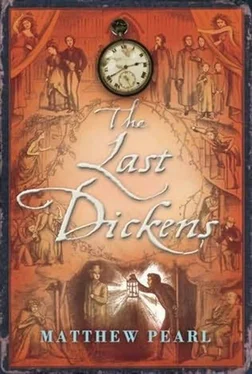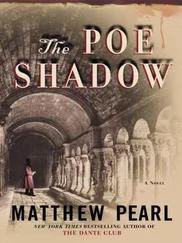Osgood thought it an opportune time to interject with a question, but Forster put an imperial hand on his shoulder and steered him.
“There: that watercolor the workman is bringing through now from the dining room. That, Mr. Osgood and Miss Sand-is that the name, little dear?-that is a painting of the steame r Britannia that Mr. Dickens sailed on in his first trip to America, the fourth of January, 1842. That will be discussed in chapter nineteen of my Life of Dickens. Hold that up higher, you, men, don't let that frame's corner damage the wall!”
Osgood felt a sharpness, a recrimination in the word America.
“I hope you'd agree that Mr. Dickens's second tour of America,” Osgood said, “was a verifiable success.”
Forster laughed grimly and wrung his hands out as if squeezing wet laundry. “Monstrous thought! Your tour left Mr. Dickens ill, hobbled in his foot, drained of all life with which he parted from our shores! I fully opposed his going, as I said at the time to that gold-hungry gorilla Dolby. If American readers had not taken Mr. Dickens's books without paying any authors’ fees for so many years, if they had made us part of your copyright laws, he oughtn't ever needed the extra income. To think of everyone prancing around calling Mr. Dickens ‘Chief like he was an Indian savage-!”
“Charles liked to be called Chief, if I recall,” a female voice interrupted. “With the many things to make us sad, we can at least be happy he still had enough vigor for travel.”
The voice from above belonged to an elegant and slender woman a few steps past forty years old coming from upstairs.
“May I present to you, Miss Georgina Hogarth,” muttered Forster indifferently to their guests. “My fellow executor to the house and all its possessions.”
“Please call me Aunt Georgy. Everyone at Gadshill does,” she said in a soothing tone that overthrew Forster's shrillness.
Osgood knew her by name to be Dickens's sister-in-law. Even after Catherine, Charles Dickens's wife, moved away from Gadshill, Aunt Georgy was the novelist's confidante and housekeeper, and a mother to her two nieces and six nephews. The separation between Dickens and Catherine was never an official divorce-the novelist of domestic harmony could not afford so permanent a stain on the public record. Dickens's novels celebrated the family and the ideals of loyalty and forgiveness. The audience expected him to be an exemplar for the same.
Dickens and Georgy became so close that other members of the Hogarth family, furious that she had supported Charles, were even said to have repeated wicked slanders that he'd seduced her. It did not help allay the whispers that the lovely Georgy never married.
Osgood recalled that Harper's magazine had been only too pleased to sell copies by importing the rumors about Dickens and Georgy back to America. To make the affair still more notorious, a young lady, Mrs. Dickens's sister, has undertaken to “keep house” for Dickens , the magazine had commented when Catherine had moved away more than ten years before. The whole affair is very repugnant to our idea of matrimonial constancy.
“Thank you both. I can see well enough you are quite occupied without our intrusion,” said Osgood.
“In truth, Mr. Osgood, we only wish there were more guests who were not dreadful auctioneers or house seekers tramping up and down the stairs.” Aunt Georgy had a ready smile that brought to mind a picture of the lively household as it used to be. “Shall we?”
In the drawing room, a matronly and attractive young woman approximately of Osgood's age sat caressing the keys of the rosewood piano. She wore a fashionable mourning dress, weighed down by elaborate mourning jewels, and played with an abstracted air.
Osgood, momentarily distracted by the music and its performer, introduced their mission to his hosts. “Our firm is set to publish The Mystery of Edwin Drood in America. Yet back home we are surrounded by literary pirates, who will use the impunity that comes with Mr. Dickens's decease to plunder the text for themselves.”
“Typical Americans!” Forster intoned. “Greed comes in abundance in Yankee-doodle-dom.”
“There is plenty of it here, too, Mr. Forster,” Georgy chided Dickens's friend.
“Because of the peculiarity of our laws,” continued Osgood, “we will be in a rather bad way if the pirates issue their cheap copies. We had relied upon expectations of a success for our firm-and of course for royalties to Mr. Dickens, mandated by our morals though not by our laws. These would go to you and your family now,” he said, turning to Georgy. “That shall never be able come to pass if Dickens's wishes that we are his exclusive publisher vanish with his death.”
At this point in the interview, a small white blur, which turned out on closer inspection to be a Pomeranian dog, flew across the room and landed at Osgood's feet. She gave a sharp bark for Osgood, but when he reached down, she shook her muzzle and barked at him with recrimination. The piano-playing woman came to a discordant stop and lifted her wide skirts as she rushed over. The musician, throwing back her mourning veil to show her face, was presented as Mamie Dickens, the novelist's first daughter, the one Forster had dismissed as comely and unmarried.
“I am very sorry for her behavior, Mr. Osgood,” Mamie said shyly. “That is Mrs. Bouncer, she is a sweet creature but truly like Mephistopheles’ little dog when she is angry. Like a true well-mannered young woman of England, she does not ever tolerate a man reaching for her. She likes to be petted by a man's foot instead.”
Mrs. Bouncer went round and round Osgood with an asthmatic barking. Osgood exchanged a quick glance with Rebecca, who seemed to want to laugh but suppressed the urge. Osgood unfastened his shoe and, Mrs. Bouncer immediately flopping over, scratched the dog's stomach with his foot.
“Oh, isn't that lovely!” Mamie exclaimed as she bit her bottom lip with emotion. “That is everything she has been missing. Oh, no-must that go, too?” she said, spinning around, distracted. A workman was wrapping a pink tazza taken from the mantelpiece. “I did always admire it when I was a little girl. Can I stop that terrible work person, Auntie?” she whispered.
“I'm very sorry, Mamie, you know we can only afford to keep what is necessary.”
Osgood passed a look of sympathy at Mamie. Rebecca watched Osgood as he watched the piteous young Miss Dickens. For a few moments, the three were as captive and uncertain as figures in a sketch.
“We were hoping,” Osgood said, returning to their topic, “there might be more pages that have been found here for The Mystery of
Edwin Drood , beyond the six installments that Mr. Forster has sent us in Boston.”
Georgy shook her head sadly. “I am afraid there are not. The ink on the final slips of paper of the sixth installment was still drying at his desk when he had his collapse. I saw it myself.”
“Perhaps there are memorandums or fragments? Or private correspondences about his plan for the rest of the novel that could satisfy a reader's natural curiosity.”
“It might have been possible,” Georgy replied. “But Mr. Dickens burned his letters periodically and asked his friends to do the same. He had a great horror of the improper uses often made of the letters of celebrated people. I can recall years ago when he had a bonfire and the boys roasted onions on the ashes of letters of great men like Tennyson, Thackeray, Carlyle.”
“Tell me, Mr. Osgood,” Forster interrupted with a strange, contemptuous expression, “what good would notes on the book do you, even if there were any, without Charles Dickens to write the chapters themselves?”
Читать дальше












